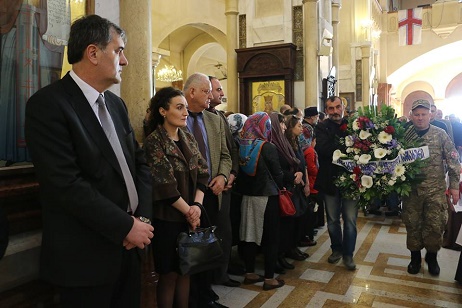Georgia pays tribute to Babushera tragedy victims

The bodies of 12 more Georgians found in a mass grave in Abkhazia, at Sokhumi’s Babushera Airport have been identified and will today finally rest in peace at the Tbilisi Brothers’ Military Cemetery.
Families of the fallen soldiers will finally know where the graves of their loved ones are after 23 years.
The bodies were currently lying in state at Sameba Holy Trinity Cathedral, the country’s central cathedral in Tbilisi’s Avlabari district for public to pay tribute. This afternoon the bodies will be taken to Dogomi for an honourable burial.
The bodies were taken from a mass grave in Abkhazia, identified using DNA testing and returned to their loved ones who did not have a grave to honour their sons and husbands for more than two decades.
All of the 12 victims were passengers of the Tbilisi-Sokhumi flight which was shot down as it attempted to land at Babushera Airport in Sokhumi during the Abkhazia war.
Georgia’s Minister of Internally Displaced Persons from the Occupied Territories, Accommodation and Refugees of Georgia Sozar Subari said an additional 208 bodies were still to be taken from the mass grave in Abkhazia and identified.
The Minister said being buried in Abkhazia meant these people were buried in their homeland but opening the mass graves and identifying the bodies was necessary for their families to finally have a chance to hold a proper burial for their loved ones.
The war in Abkhazia in the early 1990s ended with the area becoming a breakaway region of Georgia and leaving hundreds of thousands displaced.
The confrontation started on August 14, 1992 and lasted for 403 days. It was one of many conflicts precipitated by the breakup of the Soviet Union and was one of the bloodiest, most consequential and most unresolved battles of the time.
During the 1992-93 conflict, tens of thousands of civilians and soldiers lost their lives and about 300,000 people were displaced.
The war was waged mainly between Georgian government forces on one side and Abkhaz separatist forces on the other, who fought for the independence of Abkhazia from Georgia. The separatists were supported by the Russian armed forces and North Caucasian hired fighters.
The families of those killed in Abkhazia could not retreive the bodies of their loved ones. The scale of the damage and the tense situation in the region meant it was impossible to identify the bodies and return them home. Those who were killed were buried in mass graves without being formally identified.
Authorities began to excavate the graves in May 2014 following lengthy negotiations between Tbilisi and Sokhumi.
International humanitarian aid group Red Cross helped facilitate cooperation between de facto Abkhaz authorities and Georgian officials. The graves of the unknown victims were opened and DNA samples were taken from all the remains.
Once the bodies were identified they were returned to their families and loved ones. This process of opening the graves and identifying the bodies is still ongoing.
 Tweet
Tweet  Share
Share